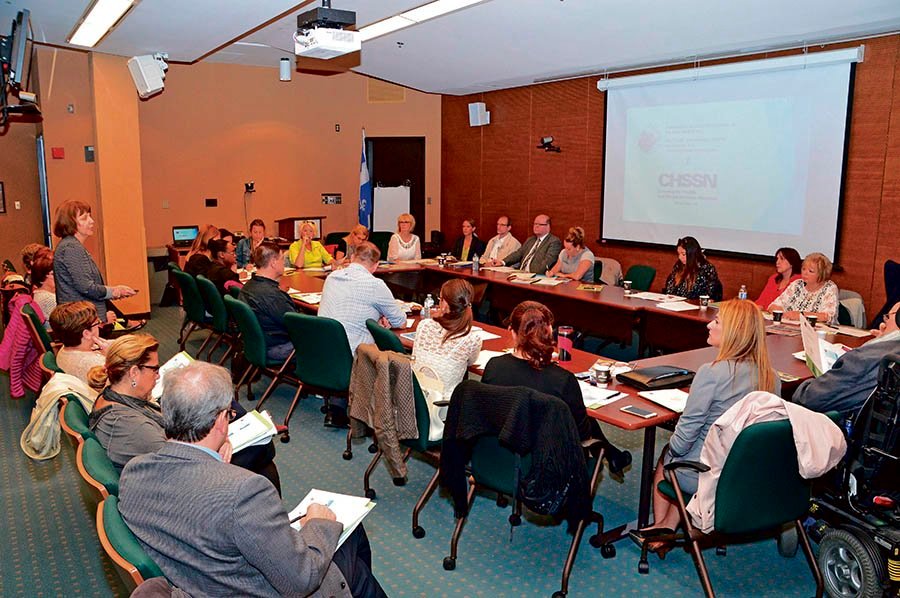Martin C. Barry
According to a 2015 province-wide CROP survey of community vitality among Quebec’s English-speaking population, the anglophone community in Laval underwent the greatest amount of growth, increasing from 31,357 English-speakers in 1996 to 82,000 in 2011.
When Quebec’s English-speaking communities were compared in the survey, Laval – where the total population now exceeds 400,000 – saw the greatest jump, said Joanne Pocock, a consulting researcher for the Quebec City-headquartered Community Health and Social Services Network.

Growth in English community
Presentation of the findings from the CHSSN survey, which was funded by a grant from the federal government, were the main subject of a special meeting of Agape NPI Partners held at Cité de la Santé on Sept. 29.
“Laval is always remarkable to us at CHSSN for being such a growing English-speaking community,” Pocock continued. She said she presumed that the surge in Laval over the 15-year period probably represents “a lot of young families and children that probably are fitting in there.”
With the aid of a graph, Pocock pointed out, without overstating, that around 16,000 of the anglophones in Laval are 55 years old and over. “That’s a fair number,” she said. “They represent over 19 per cent of the English-speaking population. Substantial.”
Kevin McLeod, executive-director of the Youth and Parents Agape Association Inc. which anchors NPI Partners, interjected that Agape is currently in the process of beginning groundwork for the establishment of an English-speaking senior citizens’ wellness centre.

English wellness centre
“Laval needs to have a wellness centre for English-speaking seniors,” he said. “What we’re trying to do is we’re trying to get some funds together because of the importance, having Place des Aînés, we have a lot of community groups, we have a lot of seniors clubs. We have all this working out, but we need a wellness for seniors. That’s one of our projects we’re working on right now.”
When Agape social worker Ian Williams pointed out that a significant amount of Laval’s English-speaking population sees itself forced to go to the island of Montreal to seek out health and social services in their own language because they are usually not available here, CHSSN’s Pocock said the question did come up in the CROP survey as to whether individuals are using services outside their region.
Lack of English services
“There’s a fair proportion that comes up for Laval,” she said. “We also asked them what was your main reason? There were lots of reasons cited, but certainly what came out on top in Laval was that they didn’t have access to English services in their region. That’s why they found themselves going elsewhere. That’s their main barrier.”
Examining some income statistics, Pocock said “it’s certainly remarkable in Laval to see that 50 per cent of the 65 and over are living on a low income” which is often less than $20,000 per year.
“We know from research that lower income individuals tend to be less healthy, so they have a demand for services, and they’re less likely to be able to afford private services. So you are going to see that clientele at your hospital or at your CLSC. They need those public services.”
Two-hundred-and-seventy respondents from Laval in the survey were asked how satisfied they were with access to health and social services in English. More than 50 per cent replied that they were not satisfied.
Not satisfied with service
“If you look across the regions, you’ll see that’s among the highest reporting no satisfaction,” Pocock added. Just 22 per cent responded being affirmatively satisfied with the level of service, she said. While the sampling may seem small, she confirmed to Williams that “it’s a statistically substantial group” for a population of 82,000. She elaborated on the implications for Laval’s English-speaking population.
“It’s been shown when you’re in a situation of poor health, when you’re older, age also affects this. There are a number of elements actually that come into play at the point of communication, at the point of access. Which means you don’t use your second language as easily as you might in other situations. So when you have a health issue, when you’re anxious, stressed, age also affects your capacity to use your second language.”



